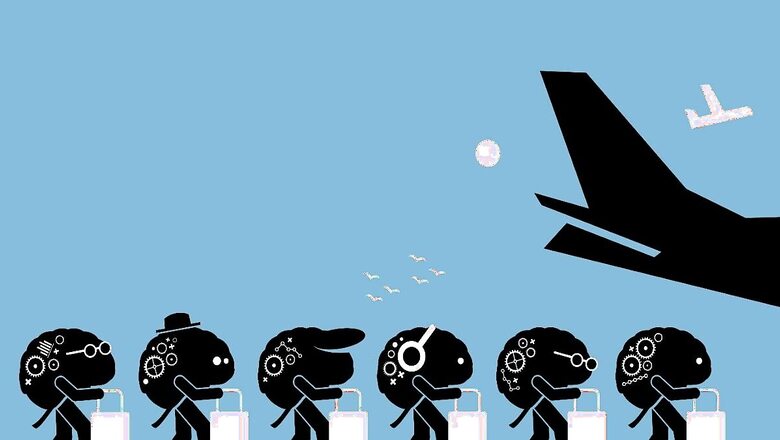
views
Western media is full of stories of Indian entrepreneurs “fleeing” to the West. Sections of the Indian media parrot this narrative. In a globalised world, Indian startup entrepreneurs obviously seek global markets. Hubs in Dubai, Singapore, London and San Francisco have long attracted talented Indian entrepreneurs. But the “brain drain” theory is now being turned on its head.
According to several startup entrepreneurs, the fear of missing out (FOMO) is about missing India’s digital, financial and infrastructure boom. Europe is in recession and traumatised by the grinding Russia-Ukraine war. Japan slipped into recession in the October-December 2023 quarter. China’s economic slowdown and geopolitical tensions with the West have alarmed foreign businesses. Dubai and other Gulf entrepots remain a hub for global Indian firms but the Gaza conflict could disrupt trade in the region, especially around the Red Sea. India in contrast is a picture of economic stability and opportunity. It’s not only the business environment that draws successful Indian entrepreneurs back home.
As Hemant Mohapatra, who worked for several years in the West for AMD, Google and Andreessen Horowitz, wrote in a blog on Medium: “For those that don’t know me well, I went to the US in 2003 and have been visiting India 1-2 times a year till 2014 and often 3+ times a year since 2014. So I’ve been able to observe the small shifts better than most locals did, and of course, the macro-trends that are now obvious to most.
“India fintech is way, way ahead of the US/EU. For offline, there were weeks I didn’t use cash — most places take cards, UPI and a dozen other options. For online, I use UPI for most online purchases. Can’t believe I am saying this but online purchases in India feel easier via UPI in India vs CCs or PayPal in the US.
“Overall, I couldn’t be happier with my move. I feel lucky to be in India at a time many of the growing pains have subsided and the startup ecosystem feels a lot more mature. As a VC, I wanted to be somewhere I could look back 10 years out and feel like I made a difference and I strongly believe that with a lot of hard work and a dash of good fortune, I have a chance to make such an impact on India in 10 years. Moreover, from a macro POV, India is now globally #3 in terms of GDP by PPP and also #3 in the world for software projects checked into GitHub.”
Brain gain
There is a strong technology-driven impetus for the brain drain to go into reverse. One theory advanced on the ManageEngine platform notes: “Spurred by the recent big tech lay-offs in the US, and with insurmountable H-1B visa renewal issues, Indians in the US especially, are summoning their entrepreneurial spirit, capitalising on the knowledge they obtained, and creating new opportunities for many when they return to their homeland.
“These techies are coming back with a wealth of experience from the big tech world and are adapting this knowledge into a model that’s more suited for their environment. The recent SaaS boom in India over the past decade or so bears witness to this surge in Indian entrepreneurship driven by talent repatriation. India is now the second largest SaaS ecosystem in the world by volume, behind the US.”
Sceptics of the reverse brain drain point to dozens of Indian-origin CEOs of top tech companies in the US — from Satya Nadella in Microsoft to Sundar Pichai in Alphabet (Google) — whose loss to India’s tech ecosystem is incalculable.
Over-regulation
The reverse brain drain from the West to India could become sustainable if the Indian government established a more consistent and predictable regulatory framework.
A key reason why Indian entrepreneurs leave the country to work abroad is the tax and regulatory structure in India. The RBI and SEBI, for example, are strong regulators but still have a “controlling” rather than an “enabling” mindset. India’s personal tax laws need reform as well. The excellent Direct Tax Code (DTC) remains on paper more than five years after it was submitted to the finance minister by a panel of experts.
India’s strengthening geopolitical relationship with the United States has spurred Fortune 500 companies to set up global capability centres (GCCs) in India. In effect, India has graduated from being the world’s back office with BPOs 25 years ago to becoming the world’s research, design and engineering epicentre.
During his visit to India last month, Microsoft CEO Nadella said India has 13.5 million AI software developers on its GitHub innovation platform. That is the second largest software developer community in the world after the US (20 million). China is third. Japan, Hong Kong and the UK have been left way behind. Nadella predicted that by 2027, India would overtake the US in the number of AI software developers on GitHub.
For Indian entrepreneurs such a large AI-focused community of software developers based in India presents an opportunity of a lifetime. In many tech areas, Nadella concedes, India is already ahead of the US and Europe, pointing out, as others have done, that UPI is more advanced as a nationwide payments platform than anything available in the West.
The brain drain was emblematic of 1960s India stuck in a socialist mould that forced talented Indians to flee abroad. The reverse brain drain is set in an India bursting with entrepreneurial energy. The grass is no longer greener on the other side.
The writer is an editor, author and publisher. Views expressed in the above piece are personal and solely that of the author. They do not necessarily reflect News18’s views.



















Comments
0 comment